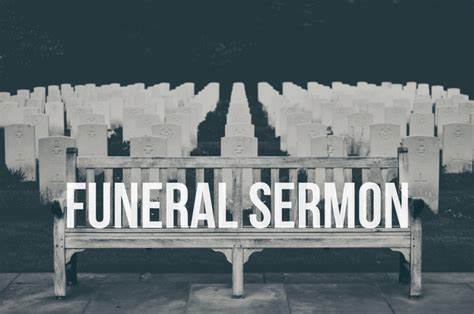Creating An Impactful Funeral Message
Creating an Impactful Funeral Message
We’ve been considering various parts of a funeral in the previous posts. Here’s the first in the series. In this post we turn specifically to creating an impactful funeral message that will build on your preparation for the funeral.
The Usual Rules Apply
 In other words, creating an impactful funeral message follows the general rules for a sermon. They are:
In other words, creating an impactful funeral message follows the general rules for a sermon. They are:
- Plan an effective introduction that accomplishes three things: introduces yourself (if necessary); grabs peoples’ attention; and introduces the subject for your message.
- Is organized in a way that listeners can follow your thoughts. However, in the funeral message there is greater latitude in organization, because your subject matter is clear–there’s been a death, and you’re going to talk about it and the person who died.
- Has a conclusion that calls people to change an attitude or take some action.
Those are very general rules, and you can find more about them in previous posts on this blog as indicated by the links above.
An Impactful Funeral Message Preaches Jesus
 You will not likely know many people at the funeral (as noted earlier). So, don’t assume that they are all believers. You can never go wrong in telling people about Jesus. Specifically, you can tell about God’s love in coming to the earth in Jesus Christ. Explain his willingness to die on the cross for sin. Tell them about the promise of heaven. You can even quote from Revelation 21, that there will be no more tears, no more mourning, and no more parting. Invite them to accept this promise of eternal life by accepting Jesus into their life.
You will not likely know many people at the funeral (as noted earlier). So, don’t assume that they are all believers. You can never go wrong in telling people about Jesus. Specifically, you can tell about God’s love in coming to the earth in Jesus Christ. Explain his willingness to die on the cross for sin. Tell them about the promise of heaven. You can even quote from Revelation 21, that there will be no more tears, no more mourning, and no more parting. Invite them to accept this promise of eternal life by accepting Jesus into their life.
Remind People That Grieving in Normal

Jesus weeping at Lazarus’ tomb
I often refer to John 11:35, the shortest verse in the Bible: “Jesus Wept”. The original Greek word used here indicates that this wasn’t a tear falling upon the cheek of Jesus. He wailed, even cried out at the pain of death. In fact, this word is used to describe the snort of a warhorse as it entered battle. I believe that Jesus knew that he was going to raise Lazarus from the dead, but he also acknowledged that the death caused pain to Mary and Martha and the others gathered there. Jesus cared about these people, and indicated in his weeping that this death, this situation was not what God wanted. He was creating a kingdom where people would never have to grieve. But for now, grieving was normal..
In other words, let people know that grieving, even weeping, is normal.
Declare Trust in God, But Don’t Try to Answer Every Question
I recently talked to someone whose husband died suddenly of a heart attack just a couple of weeks before his  retirement. Her life was suddenly thrown into complete chaos, and her sense of loss was overwhelming. We are friends who live at a distance, and so, didn’t see her until a couple of months after the death. Knowing that I’m a pastor, she said, “If you’ve got a reason for this that I can understand, I’d love to hear it.” There is no reason for a death like this that makes sense, so don’t try to give one. Instead, indicate that in these very difficult moments we are called to trust that God is not punishing us, but is loving.
retirement. Her life was suddenly thrown into complete chaos, and her sense of loss was overwhelming. We are friends who live at a distance, and so, didn’t see her until a couple of months after the death. Knowing that I’m a pastor, she said, “If you’ve got a reason for this that I can understand, I’d love to hear it.” There is no reason for a death like this that makes sense, so don’t try to give one. Instead, indicate that in these very difficult moments we are called to trust that God is not punishing us, but is loving.
I also found one of this woman’s statements to be particularly instructive for creating an impactful funeral message in such situations. She said, “At least no one has said something stupid to me.” What was stupid? “No one has said, ‘He’s in a better place.'” That may be true, but she wasn’t ready to hear it.
How Can It Be All Right When Everything Is Wrong?
 Lewis Smedes wrote a book years ago called, How Can It Be All Right When Everything is All Wrong. In the first chapter he tells about visiting a good friend who is dying. As Smedes was leaving his friend’s room, the friend said, “It’s all right, Lew.” Smedes reacted as he left. It’s not all right for his wife, his children, or even for me. Then the rest of the book describes learning to trust a God who could allow such a loss.
Lewis Smedes wrote a book years ago called, How Can It Be All Right When Everything is All Wrong. In the first chapter he tells about visiting a good friend who is dying. As Smedes was leaving his friend’s room, the friend said, “It’s all right, Lew.” Smedes reacted as he left. It’s not all right for his wife, his children, or even for me. Then the rest of the book describes learning to trust a God who could allow such a loss.
In other words, it’s okay to say that the death doesn’t make sense.
Embody Your Impactful Message
Remember as you preach that you embody the presence of Jesus. Make sure that you are caring about the people who have experienced the loss. Ask for the heart of Jesus for these people as you prepare and as you go about creating an impactful funeral message for the people.
Here’s another creative way to look at creating an impactful funeral message:



